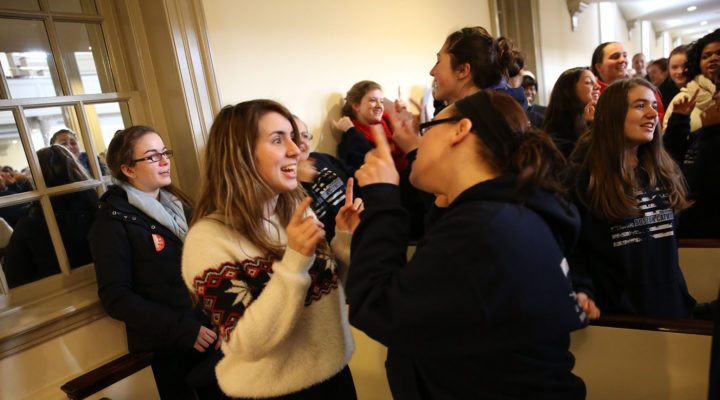Younger Americans are abandoning organized religion in ever greater numbers and it’s no shock that churches can’t control the underlying social forces driving that decline.
But they aren’t totally powerless, either, says Kristina Lizardy-Hajbi, director of the United Church of Christ’s Center for Analytics, Research and Data and author of its newly released 2015 report, “Engaging Young Adults.”
Actually, just about any church may possess or gain the qualities needed to draw young adults, she says. And it’s not about having lots of resources.
Congregations with thriving young adult ministries aren’t always those with huge memberships and budgets, Lizardy-Hajbi said during a Tuesday FaithSoaring Churches conference call sponsored by The Columbia Partnership.
“We think it’s big churches with a lot of money, but we found this doesn’t make that big of a difference,” she told listeners on the call.
‘Any type of congregation’
With thousands of U.S. churches closing annually and many more experiencing varying degrees of numeric and financial decline, Christian leaders have become increasingly interested in how to attract younger generations.
Simultaneously, the rise of the nones and the dones — people with no affiliation, or those formerly affiliated — has also been growing.
“Young adults pose a vexing and urgent challenge for congregations,” she said in her report.
“On the one hand, they are particularly crucial for growth. On the other hand … today’s young adults are less religiously affiliated, and less inclined toward religious belief and practice than ever before,” she wrote.
The resulting decline in attendance leaves churches struggling. Adults ages 18 to 34 comprise 23 percent of the U.S. population, but only one in 10 congregations reflects that ratio.
But there are many churches which have found ways to launch and sustain vibrant ministries to young adults in this environment,Lizardy-Hajbi said during the Tuesday conference call.
“Engaging Young Adults” studied successful programs for commonalities that could be shared with other churches.
Some of the findings were surprising. One was that success is possible with both paid staffs or volunteers, she said.
“For me, that translates into something that can be very accessible for any type of congregation.”
The gifts and determination of a congregation are much more important than its bank accounts, she noted.
The power of passion
The survey also found that many new young adult participants often aren’t recruited from outside the church but from within. They usually are related to or friends with existing members — even those who aren’t frequent attenders, Lizardy-Hajbi said.
“Passion combined with priority can be powerful.”
Motivation is also important in attracting and keeping young people, she said. They’ll be turned off to learn a congregation’s goal is simply to boost attendance and giving.
Young Americans generally are seeking authenticity and community in any institution to which they belong. Churches must remember that young adults can find that sense of belonging in many places other than houses of worship.
In fact, they don’t even need church for spirituality, she added.
“Faith and church are separated now. And community and church are separated now.”
What keeps many of them coming back, she said, is a church’s commitment to helping the community.
“If they find a church unwilling to focus on missions, then the young adult may end up leaving.”
Another common denominator of successful young adult programs is the reliance on social media for communication and fellowship.
“So using Internet tools to connect is a huge factor for this generation.”
Rural churches were found to have the biggest challenge providing vibrant ministries to young adults, Lizardy-Hajbi said.
It’s not because they lack the willingness, but because they need a growing population around them.
“Context is also incredibly important,” she noted.
Churches with healthy young adult programs are those surrounded by population growth “and therefore are growing young adult populations.”
But the most important ingredients, Lizardy-Hajbi said, are priority and passion for young adult ministry.
“Passion combined with priority can be powerful.”



